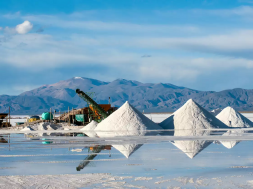
Lithium, cobalt production to soar as demand for clean energy increases: World Bank
It estimates that over three billion tonnes of minerals and metals will be needed to deploy wind, solar and geothermal power as well as energy storage required for achieving a below two degrees celsius future
Washington DC : A new World Bank Group report shows that production of minerals like graphite, lithium and cobalt could increase by nearly 500 per cent by 2050 to meet the growing demand for clean energy technologies.
It estimates that over three billion tonnes of minerals and metals will be needed to deploy wind, solar and geothermal power as well as energy storage required for achieving a below two degrees celsius future.
The report ‘Minerals for Climate Action: The Mineral Intensity of the Clean Energy Transition’ also finds that even though clean energy technologies will require more minerals, the carbon footprint of their production — from extraction to end-use — will account for only six per cent of the greenhouse gas emissions generated by fossil fuel technologies.
The report underscores the important role that recycling and reuse of minerals will play in meeting increasing mineral demand. It also notes that even if we scale up recycling rates for minerals like copper and aluminium by 100 per cent, recycling and reuse will still not be enough to meet the demand for renewable energy technologies and energy storage.
In the current global context, COVID-19 is causing major disruptions to the mining industry across the world. In addition, developing countries that rely on minerals are missing out on essential fiscal revenues and, as their economies start to reopen, they will need to strengthen their commitment to climate-smart mining principles and mitigate any negative impacts.
“COVID-19 could represent an additional risk to sustainable mining, making the commitment of governments and companies to climate-smart practices more important than ever before,” said Riccardo Puliti, World Bank Global Director for Energy and Extractive Industries and Regional Director for Infrastructure in Africa.
“This new report builds on the World Bank’s long-standing expertise in supporting the clean energy transition and provides a data-driven tool for understanding how this shift will impact future mineral demand.”
The report said that some minerals like copper and molybdenum will be used in a range of technologies while others like graphite and lithium may be needed for just one technology: battery storage. This means that any changes in clean energy technology deployments can have significant consequences on demand for certain minerals.













